 Maldives : Safety by City
Maldives : Safety by City
The Maldives — not just “Maldives” — refers to a whole chain of 26 natural atolls made up of nearly 1,200 coral islands scattered across the Indian Ocean.
Think of it like saying “The Bahamas” — it’s a collection, not a single place.
It’s pronounced MAHL-deeves (rhymes with “heaves”), not “Mal-dives” like diving into a pool.
Each atoll has its own geography, local islands, and resorts, and getting around usually means a seaplane, speedboat, or domestic flight.
And if you’re wondering what an atoll is, it’s a ring-shaped coral reef, often with islands on it, that surrounds a lagoon.
The Maldives has a long history, once a crossroads for ancient trade routes, with cultural influences from South Asia, Arabia, and Africa blending into what it is today — a Muslim-majority island nation known for its tight community life and deep ties to the ocean.
It’s also tragically where surfer Jay Moriarity, of Chasing Mavericks fame, died in a free-diving accident in 2001, a reminder that even paradise demands respect.
If you’ve ever heard the saying “Live Like Jay,” that’s who it refers to.
Despite its remote location, more than two million tourists visited the Maldives in 2024 — a record-breaking number — drawn by the promise of overwater villas, neon-blue lagoons, world-class diving, and the kind of barefoot luxury that’s become harder to find elsewhere.
Whether you’re here to snorkel with manta rays, dive deep shipwrecks, or just sit still on a deck over the ocean, the Maldives still delivers what it’s always quietly promised: a true escape.
Warnings & Dangers in Maldives

OVERALL RISK: LOW
The Maldives is generally safe for tourists, especially on resort islands. Violent crime is rare, but petty crime can happen in populated areas like Malé. The main risks are environmental, like strong ocean currents or unexpected weather, rather than crime. Terrorism is a possibility, and we'll explain that in more detail later in this article.

TRANSPORT & TAXIS RISK: LOW
Taxis are common in Malé and Hulhumalé, but everywhere else, you’ll travel by speedboat, ferry, or seaplane. Island-hopping sounds fun, but it is expensive and time-consuming; you can’t just boat from atoll to atoll casually. This risk is medium due to the planning, time, and knowledge required to manage your transportation.

PICKPOCKETS RISK: LOW
Pickpocketing isn’t a major issue at resorts, but it can happen in crowded public spaces like markets and ferry terminals in Malé. While the risk is low, keep your valuables secure and be cautious when handling cash or your phone in busy areas. On the resort islands, theft is rare, but still lock up passports and extras.

NATURAL DISASTERS RISK: MEDIUM
The Maldives is vulnerable to tropical storms, especially during the wet season (May–November). Cyclones are rare but possible. Low elevation across the country also makes some islands vulnerable to flooding. Treat this as a medium risk and ask your resort concierge for guidance on what happens if the weather turns.

MUGGING RISK: LOW
Mugging is extremely rare in the Maldives, especially on resort islands where security is tight. In Malé, isolated street robberies can happen late at night, but tourists aren't common targets. Using basic street smarts — like not wandering alone after dark in less populated areas — helps avoid any issues.

TERRORISM RISK: MEDIUM
This is a medium risk based on the government advisories we reviewed. Groups linked to ISIS and Al-Qaeda have threatened attacks on tourist sites in the past. Maldivian authorities monitor threats and have disrupted several plots. Resorts are considered lower risk than public areas like Malé, but it’s still smart to stay alert.

SCAMS RISK: LOW
The risk is low if you know what to look out for. Watch for fake tour operators offering “discount” excursions in Malé or on local islands. Always book through your resort or a vetted company. ATM skimming has happened in the past, so stick to machines at banks or trusted hotels when you need cash.

WOMEN TRAVELERS RISK: LOW
Women can travel safely to the Maldives, especially at resorts where harassment is virtually unheard of. On local islands and in Malé, modest dress is respectful and lowers unwanted attention. Walking alone during the day is generally fine, but at night, it’s better to stay in populated or well-lit areas.

TAP WATER RISK: HIGH
Tap water is not safe to drink in the Maldives, making it a high risk. Resorts typically provide bottled water, and you should stick to that for drinking and brushing your teeth. On local islands, bottled water is easy to find and cheap.
Safest Places to Visit in Maldives
The official Maldives travel website is visitmaldives.com.
It might help to pull up the map section as you read — it’ll make the layout a lot easier to follow.
Most travelers stick to the resort islands, which are private and well-managed. Some of the most popular and reliable choices start in the North Malé Atoll.
This is where you’ll find major resorts like Baros and Bandos — close to the airport, easy transfers, and a lot of great snorkeling right off the beach.
South Malé Atoll is another strong pick if you want great diving.
It’s a little quieter, with top sites like Cocoa Thila and Kandooma Thila, famous for shark sightings and vibrant coral walls.
For luxury stays and high-end dining, Baa Atoll is a standout.
It’s a UNESCO Biosphere Reserve, so you’ll find protected marine life, Manta Ray hotspots like Hanifaru Bay, and a few of the Maldives’ most famous resorts like Soneva Fushi and Amilla Maldives.
Addu Atoll, at the southern tip of the country, is ideal for experienced divers.
It’s home to British Loyalty, one of the best wreck dives in the Maldives, plus calmer channels and a less touristy atmosphere.
If you’re looking for local culture without too much compromise on comfort, Maafushi Island in South Malé Atoll has grown into a traveler favorite.
It’s one of the few inhabited islands that balances guesthouses, restaurants, and local life without feeling chaotic.
Places to Avoid in Maldives
While the Maldives is famous for its luxury resorts and peaceful islands, not everywhere feels like a postcard.
Populated areas like Malé and Hulhumalé have seen occasional gang-related violence, and tourists wandering beyond the main streets, especially at night, can sometimes end up in the wrong place at the wrong time.
If you’re visiting Malé for sightseeing or transit, stick to daylight hours and stay aware of your surroundings.
Weather-wise, the rainy season runs from May to November.
You’ll still get sun, but sudden storms, rough seas, and flight delays can be a headache if you’re hopping between islands.
Ramadan can also shift the travel experience, since the Maldives is a Muslim country, many local services slow down or close during daylight hours, and food and drink options can be limited outside of resorts.
If your trip is more about exploring local islands than lounging at a private resort, you might want to time it carefully.
Safety Tips for Traveling to Maldives
- The Maldives has a national police force, not a separate tourism police. For emergencies, call 119. Officers on resort islands are used to working with travelers, but if you’re on a local island, communication might be slower. It’s smart to know your resort’s emergency contacts too — they usually respond faster.
- The Maldives doesn’t have a robust public alert system like some countries. For weather updates, check the Maldives Meteorological Service website or your resort’s announcements. Storms can form quickly, especially during the rainy season, so don’t rely only on the sky. Follow staff instructions if a cyclone, flooding, or tsunami warning happens.
- Driving in Czechia (Czech Republic) is doable but comes with a learning curve. You’ll need a valid driver’s license; U.S. and Canadian licenses are accepted, but an International Driving Permit (IDP) helps. Roads are generally good, but city traffic and aggressive local drivers can be intense. Rural areas are calmer, but watch for sudden weather changes.
- Leave the vape at home. As of November 15, 2024, it’s illegal to bring, sell, or use any kind of vaping device or liquid in the Maldives. Customs will confiscate them, and you could face fines or even arrest. Resorts don’t make exceptions, so don’t risk it — pack nicotine gum if you need it.
- Public religious practices outside of Islam are banned in the Maldives. You can pray or read religious texts privately inside your hotel room, but group gatherings like Bible studies are illegal. Inviting Maldivians to join you can lead to arrest, fines, or deportation. Personal religious items are allowed if kept discreetly.
- Same-sex sexual conduct is illegal in the Maldives. Conviction could mean prison time or corporal punishment. There are no anti-discrimination protections based on sexual orientation, and LGBTQ+ relationships aren’t legally recognized. While many resorts are welcoming, it’s important to stay aware of the laws and be cautious about public displays of affection.
- You can’t bring alcohol into the Maldives yourself — customs will seize it if you try. Alcohol is only available legally at resort islands, where it’s served freely to guests. Don’t attempt to carry alcohol off a resort or onto a public island; getting caught can lead to fines or arrest.
- English is widely spoken at resorts and major tourist areas in the Maldives, but less so on local islands. Staff might understand basic questions, but complicated conversations can get tricky. Download an offline translation app, and when in doubt, keep requests simple, use photos, or ask your hotel for help.
- Bring a copy of your prescription and keep the medication in its original packaging. Maldives customs can be strict, especially with controlled substances. If you’re carrying anything that could raise flags (like opioids or certain anxiety meds), get a doctor’s letter too. Follow through on this because many medications that are common in places like the U.S. aren’t available in the Maldives.
- Before traveling to or from the Maldives, you must complete an online Traveler Declaration through the official IMUGA portal within 96 hours of your flight. It’s free and mandatory. Skipping it could cause serious delays at check-in or immigration, so set a reminder and knock it out early.
So... How Safe Is Maldives Really?
The Maldives are generally safe for tourists, but there’s a risk of terrorism.
That’s according to the travel advisories of the United States, Canada, and Australia.
Extremist groups linked to Al-Qaeda and ISIS have targeted public places in the past, including areas popular with foreigners.
While the government actively disrupts plots, isolated incidents like knife attacks and arson have occurred.
Resorts stay vigilant, but travelers should remain aware.
The United Kingdom’s Foreign, Commonwealth and Development Office (FCDO) also warns of risks on the water.
That travel advisory states there is a “high risk of piracy and armed robbery” in the Gulf of Aden and the Indian Ocean.
Major General (Ret.) Wais Waheed, Director-General, National Counterterrorism Centre (NCTC) of the Maldives, stated in January 2025, “It is no secret that extremist ideologies prey on existing social grievances.
Therefore, the question we need to ask is who is best situated to intervene and address these challenges?
The answer is very simple: everyone.”
While sticking around the resort areas offers the safest place for street crimes, the risk is slightly higher once you’re out of the tourism corridors.
Strong ocean currents can surprise even experienced swimmers, so check conditions before diving or snorkeling.
Stick to licensed tour operators — poorly managed excursions and unregulated diving trips can be dangerous.
Jellyfish, stingrays, and stonefish are rare but present, so shuffle your feet in shallow water.
Also, storms and sudden squalls can pop up fast, especially during the rainy season, making boat transfers risky without warning.
Most of the risks here require nothing more than common sense and logic, but it’s not the type of place where you should let your guard down—no matter how beautiful it is!
How Does Maldives Compare?
| Country | Safety Index |
|---|---|
| Maldives | 46 |
| Djibouti | 38 |
| Croatia | 83 |
| Mexico | 65 |
| France | 64 |
| Puerto Rico | 34 |
| Somalia | 16 |
| United Kingdom | 77 |
| Peru | 50 |
Useful Information

Visas
You don’t need to stress about visas for the Maldives. Travelers from most countries get a free 30-day tourist visa on arrival — no pre-approval required. Just show proof of onward travel, a hotel booking, and enough money to get by. Customs officials are friendly but expect you to be organized.

Currency
The official currency is the Maldivian Rufiyaa (MVR), but honestly, you’ll use U.S. dollars almost everywhere, especially at resorts. Most prices at hotels and excursions are quoted in dollars anyway. Cash is handy for tips and smaller islands. ATMs exist, but they’re not always around when you need one.

Weather
Think eternal summer, but with two moods: dry season (December to April) and wet season (May to November). The dry months are peak tourist time with stunning sun. The wet season means lower prices and daily rain showers that usually blow through fast. Either way, the water stays gorgeous.

Airports
Velana International Airport (MLE) on Hulhulé Island is where almost every traveler lands. From there, you’ll either hop a speedboat, domestic flight, or a seaplane to your resort. Transfers aren’t usually included, and they can get expensive fast, so plan your arrival and departure times carefully to avoid surprise waits.

Travel Insurance
Travel insurance isn’t just a good idea for the Maldives — it’s almost non-negotiable. Between the expensive medical costs, remote islands, and unpredictable weather during the rainy season, it’s smart to have coverage for health, trip delays, and cancellations. Some resorts even require proof before confirming your stay. If you're doing high-adrenaline activities, basic travel insurance will likely need an upgrade to adventure insurance.
Maldives Weather Averages (Temperatures)
Average High/Low Temperature
| Temperature / Month | Jan | Feb | Mar | Apr | May | Jun | Jul | Aug | Sep | Oct | Nov | Dec |
|---|---|---|---|---|---|---|---|---|---|---|---|---|
| High °C |
30 | 31 | 31 | 32 | 31 | 30 | 30 | 30 | 30 | 30 | 30 | 30 |
| Low °C |
26 | 27 | 27 | 27 | 27 | 26 | 26 | 26 | 26 | 26 | 26 | 26 |
| High °F |
86 | 88 | 88 | 90 | 88 | 86 | 86 | 86 | 86 | 86 | 86 | 86 |
| Low °F |
79 | 81 | 81 | 81 | 81 | 79 | 79 | 79 | 79 | 79 | 79 | 79 |
Maldives - Safety by City
| City | Safety Index |
|---|---|
| Male | 72 |
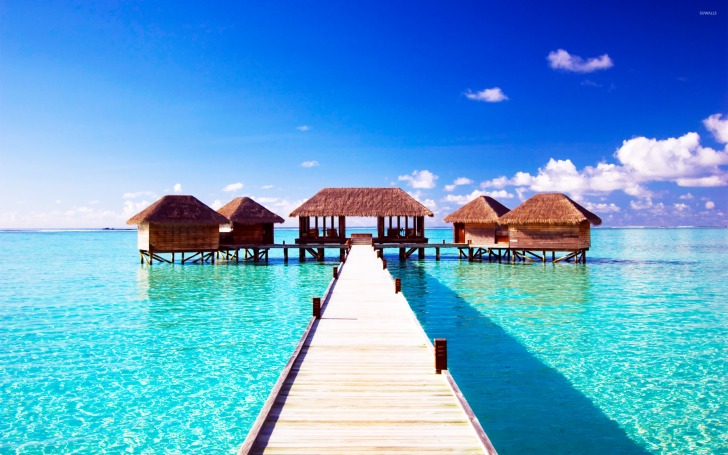
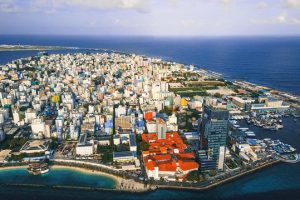
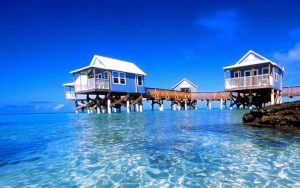
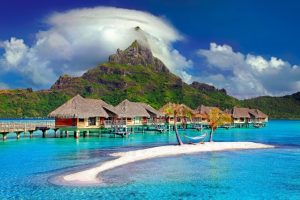
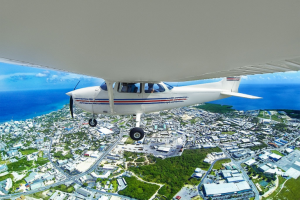
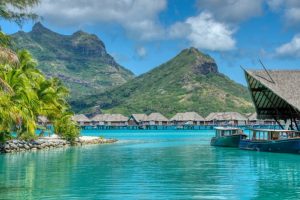
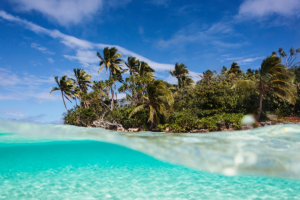





Looking forward to visiting
Being from the Caribbean, a visit to the Maldives is on my travel list as I’m curious to see how the islands compare to ours in the Caribbean. I really appreciate this post providing a great summary of safety in Maldives. It is comforting to know the common tourist spots on the islands are relatively safe.
Resorts are super safe
Truly one to visit at least once in your lifetime. I thought this was a destination for the snotty rich, with chances of me actually enjoying myself slim to nonexistent. I was so, so wrong!
As for safety, if your idea of a vacation is spending your day in the sun with cocktail after cocktail in a 5 star resort, you’ll have zero issues. Resorts are kept separate for a reason; by minimizing the contact you have with the rest of the island they make sure they can.
If you want to visit Male, Maldives’ capital city, you have to be a bit more careful than you normally would if you were in a resort. There’s a ton of traffic so the risk of pickpockets is quite high. We stayed there for one night while waiting for our friends so we could all leave for the resort; it was overpriced and way smaller than our initial estimates. The food was ok, we had a lot of specific restaurants to choose from and the people seemed extremely friendly, no matter where we went. Not an exciting city, by all means, at least for us, we didn’t click at all. We spent one day there and it was more than enough…
Their resorts, on the other hand, even the budget-friendly ones, are something else. If you feel like it, island hopping could be a huge hit, especially if you’re traveling with a bigger crowd; this will keep everyone satisfied and you get access to more water sports than if you had stayed on one island.
The weather is a tricky card though… Be careful to check for monsoon weather, July is a no from what I’ve read. I would hate to have to spend most of the time indoors…
We had the best time there, I couldn’t recommend it enough!
Maldives is not safe very bad people in Maldives